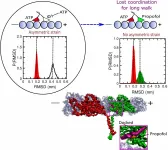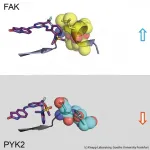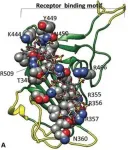(Press-News.org) Maybe space is tight in your home and you share a remote office with your spouse.
Or your partner asks you to step away from work to watch the children because they have an important call to jump on. Then you may wonder, 'Well, what makes his/her job more important than mine!'
There have been no shortage of conflicts arising from the era of COVID-19, and that includes the challenges at home between married couples.
In fact, the more a person felt that their spouse disrupted their daily routine, the more they viewed their relationship as turbulent, according to West Virginia University research.
Kevin Knoster, a third-year doctoral student in the Department of Communication Studies, led a study examining 165 married individuals and how their partners interfered with their daily routines in April 2020, a month into the pandemic. Their findings are published in Communication Research Reports.
"When you are impeding your significant other from accomplishing their goals or are disrupting their daily routines, there will be emotional responses," Knoster said. "Based on our findings, more interference from your spouse leads to sadness and anger, and that's independent from one another. This can lead to perceptions of a turbulent relationship."
Knoster was joined by fellow communication studies doctoral student Heath Howard and faculty Alan Goodboy and Megan Dillow on the project. Knoster noted that he and Howard, who are both married and living with their spouses in Morgantown, decided to explore the issue as they studied relational turbulence theory for exams while the world was on lockdown.
Relational turbulence theory argues that transitions or periods of instability can create ripples within a relationship. Previous studies have focused on military spouses returning home and empty nesters, for instance. A shift in the makeup of a relationship, therefore, can influence a change in behaviors.
Couples working remotely due to the COVID-19 pandemic presented a novel approach to researching this theory, Knoster said.
"Like a lot of people, we, too, had to adapt on the fly all of a sudden to working from home," Knoster said. "Our routines were in a state of a flux."
The age of participants in the study ranged from 18 to 74. Of those with adult children, 64 of them moved back home during the pandemic.
The research team measured participants' level of agreement on statements such as "My spouse interferes with the plans that I make." Also, the survey questions prompted respondents with "During the past month of the COVID-19 pandemic, when I have interacted with my spouse, I have felt..."
Based on the results, researchers reported that husbands and wives who had everyday routines disrupted by spouses felt negative emotions toward them and perceived the marriage to be turbulent. The negative emotions reported - sadness and anger - were specifically directed toward interactions with their spouse.
The findings fit into a larger body of research connecting partner interference with feelings of instability and a turbulent relationship.
Knoster himself has recognized his own interferences into his wife's daily routine.
"I step on her toes every now and then," he said. "I teach classes from home (on the computer) and her office is through a closed door behind me. If she needs to go to the restroom, she has to walk behind me so she may be thinking, 'Do I need to coordinate with his schedule just to wash my hands?' It's interesting. It's changed our professional lives and personal lives in more ways than we think."
But, for couples who can strategize and remain cognizant of each other's schedules, any negative emotions can drift away.
"Maybe my wife has a meeting that overlaps with my workout time," Knoster said. "I could decide to go ahead and pick up weights and drop them or I can adapt my routine. In contrast, maybe my wife doesn't care about my fitness goals. If you're getting in their way or have a 'my way or the highway' attitude, well, that's going to facilitate more negative emotional responses.
"But when you and your partner support each other's goals and accommodate routines, that elicits positive emotional reactions. We need to remember to catch our breaths for a moment and work together. It's more important now that we're sort of sequestered inside at all hours of the day and starting to feel like rats in a cage."
INFORMATION:
Citation: "Spousal interference and relational turbulence during the COVID-19 pandemic"
Washington and Chicago, January 28, 2021--The American Educational Research Association (AERA) and the Spencer Foundation have released a report, Voices from the Field: The Impact of COVID-19 on Early Career Scholars and Doctoral Students, that shares findings from focus groups conducted in spring 2020. The report, available on the AERA and Spencer websites, is part of an ongoing initiative by the two organizations to assess the pressing needs facing scholars and doctoral students during the pandemic and ways to address these needs.
"The realities of the COVID-19 pandemic and the ensuing impact on social institutions like school, work, and the family have created challenging ...
Boulder, Colo., USA: Eleven new articles were published ahead of print for Geology in January 2021. The include new modeling, geochemical evidence of tropical cyclone impacts, transport of plastic in submarine canyons, and a porphyry copper belt along the southeast China coast. These Geology articles are online at http://geology.geoscienceworld.org/content/early/recent.
Episodic exhumation of the Appalachian orogen in the Catskill Mountains (New York State, USA)
Chilisa M. Shorten; Paul G. Fitzgerald
Abstract: Increasing evidence indicates the eastern North American passive margin has not remained tectonically quiescent since ...
After analyzing the genomes of more than one-quarter of a million military veterans, a team of scientists, led by researchers at University of California San Diego, Veterans Affairs San Diego Healthcare System (VASDHS), Yale University and West Haven VA, have identified 18 specific, fixed positions on chromosomes (known as loci) that appear associated with post-traumatic stress disorder (PTSD).
The findings validate the underlying biology of PTSD, its relationship to comorbid anxiety and depressive disorders and provide potential new targets for treatment, write the authors in the January 28, 2021 online issue of Nature Genetics.
"We're very intrigued by the findings of this study, for example, as they pertain to the genetic relationships between different kinds of PTSD symptoms," ...
3D-printable resins, such as those used in dental applications, are marketed as biocompatible
Clear tooth aligners, a multi-billion-dollar industry, use these resins
Many other consumer products use 3D-printable resins
CHICAGO --- Two commercially available 3D-printable resins, which are marketed as being biocompatible for use in dental applications, readily leach compounds into their surroundings. These compounds can induce severe toxicity in the oocyte, the immature precursor of the egg which can eventually be fertilized, reports a new Northwestern Medicine study in ...
HOUSTON - (Jan. 28, 2021) - Like a wrench that gums up the gears, a common anesthetic keeps the motor proteins in your cells from making their rounds.
This is not necessarily a bad thing, but how it works has been a mystery until now.
Researchers at Rice's Center for Theoretical Biological Physics (CTBP) detail the mechanism that allows propofol -- the general anesthetic injected to knock you out before surgery -- to halt the movement of kinesin proteins that deliver cargoes along microtubules to the far reaches of cells.
The drug's effect on kinesin was known, ...
WACO, Texas (Jan. 28, 2021) - An organization that projects an ethical face but whose managers fail to respond to internal ethical situations sends mixed messages to its employees, which can lead to a lack of employees' moral courage and an increase in unethical behavior, according to a study led by a Baylor University researcher.
The study, "Management Without Morals: Construct Development and Initial Testing of Amoral Management," is published in the journal Human Relations. The research comprises three survey-based studies of 1,034 full- and part-time workers to answer the question of, "What happens when leaders do not respond to the ethical components of business situations?".
"I ...
Washington, DC — Research shows that certain segments of the population who contract SARS-CoV-2, the strain of the virus that causes COVID-19, tend to get sicker and are at higher risk for worse outcomes, and that includes pregnant women and infants under two months.
In a new study to be presented today at the Society for Maternal-Fetal Medicine's (SMFM) annual meeting, The Pregnancy Meeting™, researchers will unveil findings that suggest that women who contract COVID-19 during pregnancy are able to make antibodies, but that transfer of these antibodies to their infants is less than expected.
Antibodies are produced by the body's immune ...
Washington, DC — Pregnant women who contract SARS-CoV-2, the strain of the virus that causes COVID-19, are at greater risk of dying and experiencing serious complications compared to nonpregnant women who contract the disease, according to a recent report by the Centers for Disease Control and Prevention (CDC).
Now, in a new study to be presented today at the Society for Maternal-Fetal Medicine's (SMFM) annual meeting, The Pregnancy Meeting™, researchers will unveil findings that suggest that pregnant women who become severely or critically ill due to COVID-19 are at greater risk of dying and experiencing serious pregnancy complications compared to pregnant women who ...
FRANKFURT. Many anti-cancer drugs block signals in cancer cells that help degenerated cells to multiply uncontrollably and detach from tissue. For example, blocking the signalling protein FAK, a so-called kinase, causes breast cancer cells to become less mobile and thus less likely to metastasise. The problem is that when FAK is blocked by an inhibitor, the closely related signalling protein PYK2 becomes much more active and thus takes over some of FAK's tasks. The ideal would therefore be an inhibitor that inhibits both FAK and PYK2 in the same way for as ...
An international team of researchers led by the Universities of Liverpool and Keele, working with Public Health England, has found that the common anticoagulant drug heparin inhibits the SARS-Cov2 virus spike protein, by reducing the virus' ability to attach to human cells and infect them.
The research, published in the journals British Journal of Pharmacology, and Thrombosis and Haemostasis, found that heparin interacts with the spike protein on the surface of coronavirus (SARS-CoV2), destabilising its structure and preventing it from docking with the ACE2 receptor on human ...





